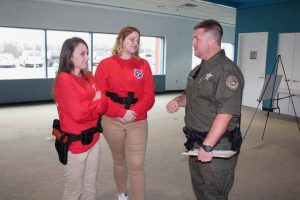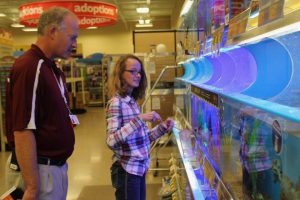By Dr. Chris Marczak
“A very large portion of a true student’s work must be done outside the classroom.” This quotation from George Washington Carver demonstrates an important concept Maury County Public Schools (MCPS) is working to integrate into our current education model.
This school year, many students are acquiring knowledge and learning new skills away from their desks through interactive classes, internships, volunteering and other work-based learning opportunities.

Santa Fe Unit School students speak with local law enforcement at the regional criminal justice competition held at Northfield Academy in November.
Education outside of the classroom comes in many forms, whether it is job-shadowing a teacher, an industry-specific class or an internship with a local business. All of these opportunities provide students with learning environments outside of the normal classroom in order to teach skills that prepare them to make decisions about their future education and career. A focus on work-based learning is another way MCPS are working to integrate the Seven Keys to College and Career Readiness and prepare each student for college or the workforce before they graduate high school.
We are working to increase work-based options for students as a result of several studies that have shown opportunities for students to gain knowledge and experience outside the classroom build a better workforce and community.
In 2012, George Washington University’s Center on Education Policy published Student Motivation: An Overlooked Piece of School Reform by Alexandra Usher and Nancy Kober. In this study a connection was made between a student’s motivation to learn and the connection they see between what they’re learning and their future. After looking at multiple programs designed to increase student motivation in the classroom, the study found that when students saw a connection between what they were learning and their interests or goal they were more motivated in class. This led to students learning the material better, increasing their self-esteem and thus feeling graduating high school or pursuing a degree and career was more accessible than before.
This is why MCPS is working to connect students with opportunities to learn more about potential careers through classes or internships. These opportunities also help students learn soft skills like working in a team, showing up on time and being responsible for projects, making them more desirable to future employers.
The Stanford University study Preparing 21st Century Citizens: The Role of Work-Based Learning in Linked Learning by M. Felicity Rogers-Chapman and Linda Darling-Hammond also discusses multiple findings surrounding work-based learning. Several mention benefits such as increased attendance and graduation rates.
This study also discusses the connections work-based learning programs can give students to their community. An example listed by Rogers-Chapman and Darling-Hammond is that of a mock-trial program at a school in San Francisco, California that works with local attorneys to prepare for competition and learn more about the practice of law. These attorneys also work with teachers to help students with other parts of pursuing a career, such as going through the interview process and completing college applications.

Spring Hill High School student Erin Harvey talks with coach Rick Brackney while cleaning fish tanks at Spring Hill PetSmart, a new MCPS business partner, during a work-based learning opportunity students had at the store.
Programs like Smelter Service Corporation’s Smelter Service Campus in Mount Pleasant, Heritage Bank and Trust’s Youth Advisory Board and the Maury Alliance’s Youth Leadership Maury program all offer students chances to learn from business leaders in their community and give them insight into new careers and employment opportunities available in our community. These relationships are essential in creating a pro-education culture across the county and getting the community involved with our students’ success at multiple levels.
Community leaders, students and administrators alike recently gathered for a panel-led event at Columbia State Community College called Ready, Set, #BeAGoodStat on Nov. 16. One of the many topics discussed was how to best help our students succeed as the state of Tennessee makes the Drive to 55, a challenge from Gov. Haslam for 55 percent of our state’s population to have a college degree or certificate by 2025. Learning opportunities outside of the classroom are vital as we make this drive and also pursue the “7 Keys to College and Career Readiness.”
Maury County Public Schools is committed to every student graduating high school being prepared to enter post-secondary education or the workforce, and we believe learning opportunities for our students that offer workforce and experience outside the classroom are imperative in reaching that goal. We also cannot offer these opportunities without the support of local businesses and organizations who are willing to take in our students.
Our students are the future of Maury County and it will take the Maury County of the present to help them be as successful as possible.
